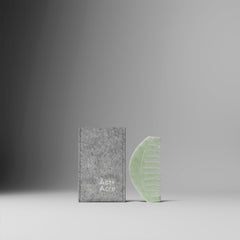
Bethany Porten
Naturopathic Medical
Student
@yeah.bethany
Congratulations, Mama! You’ve just had your little one and are living in a whirlwind of change—that sacred bonding time that happens right after birth, adjusting to a new schedule to support your little one, all the while processing a whole lot of changes happening in your body.
Remember those luscious locks you were basking in during your “pregnancy glow"? They may see some changes too.
Postpartum hair loss, or the abnormally high amount of hair you lose after pregnancy, can be an overwhelming and shocking phenomenon. But, it is completely normal.
According to the American Pregnancy Association, postpartum hair loss affects somewhere between 40-50% of women. Postpartum hair loss, known in the medical world as telogen effluvium, occurs as a result of fluctuating hormones after pregnancy. The rise in hormones such as estrogen, progesterone, hCG, oxytocin and prolactin during pregnancy essentially ‘freezes’ the normal lifecycle of our hair follicles.
As a result, hair strands that would normally be ready to fall out stick around longer—creating thicker and longer hair. Many of these hormones rapidly drop to pre-pregnancy levels after giving birth, causing all of these extra hair strands to make up for lost time and shed all at once. Unfortunately, and frustratingly, there is no instant fix for this!
Although your hair should grow back between 6-9 month postpartum, without any treatment whatsoever, there are a few natural approaches to support healthy hair growth that you may find helpful:

Prioritize a Clean Scalp
- A clean scalp, free of product buildup and dead skin cells, is critical to shaping the optimal environment for healthy hair growth. The Essentials collection is a great introduction to a healthy scalp.
Take your Vitamins
- Did you know that a clean scalp enhances vitamin absorption? Specifically, Vitamin D, Vitamin E, and the B-Vitamins. Hair is one of the fastest growing tissues in our bodies, and all of these vitamins play vital roles in cell generation.
- Studies show that not only is hair loss a side effect of being deficient in these vitamins, but that supplementing them can cause faster hair generation. Many women opt to continue taking their prenatal vitamins postpartum, which will provide many of these vitamins along with others that are good for both you and baby.
Hello, Healthy Fats!
- Omega-3s fatty acids provide you with the building blocks needed to create all the hormones in your body. Because postpartum hair loss is so intimately tied to your fluctuating hormones after delivery, loading up on this essential fat is a great way to not only help keep your body nourished and functioning optimally during this time, but also promote hair growth and strength.
Gentle Head Massages
- Simple, effective, and much needed! A gentle head massage stimulates hair follicles and provides blood flow/circulation to the scalp, which actually manipulates your hair’s gene expression to produce thicker hair. A promising study shows that massaging your head for 4 minutes a day results in thicker hair. The perfect excuse for some self-care, right?
Avoid Tight Buns and Ponytails
- Fairly self-explanatory, but often overlooked! Pulling your hair up too tightly or for too long can cause excessive tugging and tearing of hair strands. Avoiding tight hairstyles can help protect your hair follicles, and therefore protect the overall health of your hair.
Low-Level Laser Therapy
- Low-level laser therapy, which is a red-light therapy, is a safe treatment for hair growth that has been gaining a lot of traction. Studies have been showing promising results in increased hair growth for this noninvasive, and painless treatment. The red light is thought to cause increased circulation to the scalp and stimulate hair follicle growth. This treatment can be self-administered.
When Should You See A Doctor or Trichologist?
Most of the time, postpartum hair loss is a natural and normal experience, even though it can cause a lot of extra stress for new moms. That being said, there are some other health issues that can cause hair loss during pregnancy and postpartum, so it’s important to consult with your doctor if you have any concerns about your hair loss. You may also want to connect with a trichologist in addition to a doctor if you are experiencing any of the following:
- Bald patches or spots that are growing back unevenly
- Hair loss associated with skin changes, constipation, or muscle cramps
- Hair loss associated with extreme fatigue
- Hair loss that is not growing back after 6-9 months postpartum
————————
References
- Hair Loss During Pregnancy. American Pregnancy Association.
- Almohanna HM, Ahmed AA, Tsatalis JP, Tosti A. The Role of Vitamins and Minerals in Hair Loss: A Review. Dermatol Ther (Heidelb). 2019;9(1):51-70. doi:10.1007/s13555-018-0278-6
- Ablon G. A 3-month, randomized, double-blind, placebo-controlled study evaluating the ability of an extra-strength marine protein supplement to promote hair growth and decrease shedding in women with self-perceived thinning hair. Dermatol Res Pract. 2015;2015:841570. doi:10.1155/2015/841570
- Koyama T, Kobayashi K, Hama T, Murakami K, Ogawa R. Standardized Scalp Massage Results in Increased Hair Thickness by Inducing Stretching Forces to Dermal Papilla Cells in the Subcutaneous Tissue. Eplasty. 2016;16:e8. Published 2016 Jan 25.
- Zarei M, Wikramanayake TC, Falto-Aizpurua L, Schachner LA, Jimenez JJ. Low level laser therapy and hair regrowth: an evidence-based review. Lasers Med Sci. 2016;31(2):363-371. doi:10.1007/s10103-015-1818-2

Scalp Gua Sha ToolRelieve scalp tension (which is known to cause dandruff) and deliver key nutrients into deeper layers of the skin. Hair growth? ✔️ Relaxation? ✔️ Healthy scalp ecosystem? ✔️


First Last Name
Job Title / Expertise
Lorem ipsum dolor sit amet, consectetur adipiscing elit, sed do eiusmod tempor incididunt ut labore et dolore magna aliqua. Ut enim ad minim veniam, quis nostrud exercitation ullamco laboris nisi ut aliquip ex ea commodo consequat. Duis aute irure dolor in reprehenderit in voluptate velit esse cillum dolore eu fugiat nulla pariatur. Excepteur sint occaecat cupidatat non proident, sunt in culpa qui officia deserunt mollit anim id est laborum.
- Ingredient 1: explain the benefit of this ingredient and why it is good for the scalp and hair health. This is a good way to educate on specific nutrients or vitamins.
- Ingredient 2: explain the benefit of this ingredient and why it is good for the scalp and hair health. This is a good way to educate on specific nutrients or vitamins.
- Ingredient 3: explain the benefit of this ingredient and why it is good for the scalp and hair health. This is a good way to educate on specific nutrients or vitamins.
- Additional—salt, pepper, olive oil, etc.
Ingredients


- Step one to make this recipe
- Step two to make this recipe
- Step three to make this recipe
Lorem ipsum dolor sit amet, consectetur adipiscing elit, sed do eiusmod tempor incididunt ut labore et dolore magna aliqua. Ut enim ad minim veniam, quis nostrud exercitation ullamco laboris nisi ut aliquip ex ea commodo consequat. Duis aute irure dolor in reprehenderit in voluptate velit esse cillum dolore eu fugiat nulla pariatur. Excepteur sint occaecat cupidatat non proident, sunt in culpa qui officia deserunt mollit anim id est laborum.
Lorem ipsum dolor sit amet, consectetur adipiscing elit, sed do eiusmod tempor incididunt ut labore et dolore magna aliqua. Ut enim ad minim veniam, quis nostrud exercitation ullamco laboris nisi ut aliquip ex ea commodo consequat. Duis aute irure dolor in reprehenderit in voluptate velit esse cillum dolore eu fugiat nulla pariatur. Excepteur sint occaecat cupidatat non proident, sunt in culpa qui officia deserunt mollit anim id est laborum.

Stem Cell SerumLorem ipsum dolor sit amet, consectetur adipiscing elit? sed do eiusmod tempor incididunt ut labore et dolore magna aliqua. Ut enim ad minim veniam.

